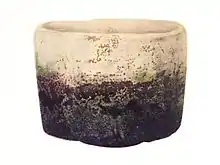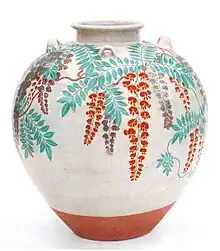Hagiyama ware
Hagiyama ware (萩山焼) refers to a type of Japanese pottery that was originally produced in Nagoya, central Japan.
.jpg.webp)
A dedicated Raku ware kiln was built in a garden on the north side of Nagoya Castle. The kiln is thought to have opened after the retirement of the 10th lord of the domain, Tokugawa Naritomo, in 1827. The 12th lord, Tokugawa Naritaka (1810–1845), actively operated the kiln and had it produce tea utensils. Since he also invited Hōraku ware and Sasashima ware potters, there are many similarities in the types of vessels, clay and glaze.[1][2][3]
Another pottery that was produced under the reign of the 12th lord was Kinjō Higashiyama ware.
See also
Other pottery from Nagoya and the wider Owari region:
References
- "萩山焼飴釉茶碗 | 前田壽仙堂". Jusendo.com. Retrieved 2021-12-05.
- 鶴田 純久. "萩山焼 はぎやまやき – 鶴田 純久の章 お話". Turuta.jp. Retrieved 2021-12-05.
- "尾張国焼鉄道の旅13:浅間町(萩山焼) | 前田壽仙堂". Jusendo.com. Retrieved 2021-12-05.
This article is issued from Wikipedia. The text is licensed under Creative Commons - Attribution - Sharealike. Additional terms may apply for the media files.

